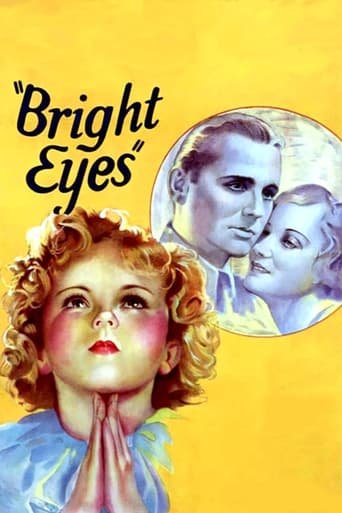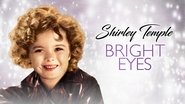Cyke
119: Bright Eyes (1934) - released 12/11/1934, viewed 9/22/08.BIRTHS: Judi Dench.DOUG: It appears I had completely misunderstood Shirley Temple's niche in Hollywood before I watched this movie. I thought that her movies were all-out musicals for kids only, but she was more for the family and all-ages market. Bright Eyes is not a kids' movie, nor is it really a musical, other than the famous Good Ship Lollipop number. That number is, I think, more indicative of a trend in the early sound period where nearly every movie made tried to incorporate a scene with music. I thought the movie was going to be predictable, and it mostly is; the Smythe family never really become more than one-dimensional caricatures, ready to toss the lovely Shirley out onto the street while still indulging their own demonic daughter's every whim. Still, it managed to surprise me in a few places. Loop and Uncle Ned, the two most awesome characters and the ones who care about Shirley the most, suddenly become enemies as they each try to claim custody. **SPOILER ALERT** I was almost in tears a couple times: when Shirley's mom dies was pretty rough (though that car hit looked awfully gentle), and Loop flying through the storm is pretty intense. **END SPOILER** If you're trying to get an idea of what Shirley Temple was all about in Depression-era Hollywood, Bright Eyes is a great place to start. Contract Player Alert: Charles Sellon (Uncle Ned) and Jane Withers (Joy) both appeared three films ago in It's a Gift, as Mr. Muckle and the hopscotch girl, respectively. KEVIN: This movie surprised me. I really didn't expect to like it much, but the themes of the film and the complexity of many of the characters kept me interested. Of course little Shirley is great, everyone knows that, but all the adult characters, none of whom I recognized right off, are all very well acted and fully fleshed out. **SPOILER ALERT** I'm not gonna lie, I was indeed moved to tears in the scene where Loop (James Dunn) must tell little Shirley that her Mom has died. **END SPOILER** And I was even more intrigued when Shirley is taken in by the snobbish, blue-blooded Smythe couple with their bratty, Nazi-in-training daughter (Jane Withers). Although the custody battle between Loop and the Smythes is the center of the movie, the film does a really good job setting up the characters and getting all its ducks in a row for maximum emotional punch. I couldn't help but giggle at the schmaltzy happy ending, starting with the judge deciding that the proceedings "won't need lawyers anymore." Everyone gets what they want and/or what they deserve, even the crotchety uncle.Last film: The Man Who Knew Too Much (1934). Next film: The Scarlet Pimpernel (1934).
Neil Doyle
Author/Director David Butler put together a script that showcases SHIRLEY TEMPLE as a lovable little girl who gets caught up in a nasty custody battle when her mother dies and her aviator god-father (JAMES DUNN)wants to adopt her. Scenes between Temple and Dunn are so natural that you'll have a hard time not getting a lump in your throat in the scene where he assures her that her mother (who has just died) is in heaven with the angels. Yes, it does get a little sticky at times.But wait!! Before things become to saccharine and predictable, little JANE WITHERS, America's most lovable brat, shows up as a nasty rich girl who delights in tormenting everyone around her, especially Shirley. It's a great role for Jane and she makes the most of it, whether imitating a machine-gunner or threatening to make mincemeat of Shirley's dolls.And believe me, she's a welcome presence in a Shirley Temple vehicle that does tend to get all dewy-eyed over the adorable princess. Watch the scene on the plane where the aviators all watch Temple as she sings "On the Good Ship Lollipop", strolling down the aisle and enjoying all the male attention. You can almost sense something darker than is supposed to meet the eye with the way they all leer at her. But she is, quite simply, at her most fetching in that casually charming little number.Shirley's first film tailored just for her, and it opened at Radio City Music Hall in 1934 to cheer Depression-era audiences with its innocent star at her most disarming. Easy to see why she would become the nation's number one box-office star four years in a row.
ccthemovieman-1
Even though there is very little singing and dancing, which is a big part of the appeal of Shirley Temple, it's still a solid film.This was the first movie in which was Shirley was the big star, I believe, and you can see why she quickly won the hearts of Americans.Although there is only one song, it's perhaps her most famous: "On the Good Ship Lollipop." The rest of the film is almost as charming as that song with many sweet, touching moments that made her films so endearing.It also helped to have James Dunn as the male lead. Dunn was one of the more likable guys in classic Hollywood, on and off the screen. He and Shirley make a great pair. Other interesting people to watch in this movie are the crabby old grandfather, played by Charles Sellon; the spoiled brat played by Jane Withers, who is so bad she's funny and an assortment of other characters from fliers to cooks to old girlfriends.The only negative is the ending. It looked like they didn't know how to end this, so they rushed to finish it without much thought. Oh, well, the main thing is Shirley's charm.....and that's there in abundance.
Michael O'Keefe
Hollywood's smallest, biggest star Shirley Temple plays an orphan caught up in a custody battle. She worships a daredevil pilot(James Dunn)and through the course of the movie gets the chance to sing and make immortal "On the Good Ship Lollipop". Also in the steadfast cast are: Jane Darwell, Judith Allen, Charles Sellon and probably the show stealer Jane Withers. Withers is the perfect rich brat to be mean to the poor little orphan(Temple). One of the better projects of the busy little "curly top".




